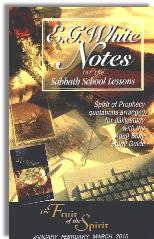|
||||||||||||||
Commentary on "The Fruit of the Spirit is Righteousness"
Day 1: Sabbath Afternoon, March 6, 2010
Overview
The author introduces this lesson on righteousness by describing righteousness in two separate parts: imputed righteousness and imparted righteousness. He describes imputed righteousness as the righteousness that Jesus did for us--the righteousness that covers us. In his words, “It is our title to heaven.” He distinguishes this from imparted righteousness, which is what He does in us, through the Holy Spirit, to mold us into His image.
He concludes by stating that these two aspects of righteousness are inseparable, although it’s all under the umbrella of “righteousness” which without, we have no hope of salvation.
Definitions
Two begin to dissect through this, it is best to define the terms we will be referring to.
Justification: The judicial act of God by which, on account of Christ, to whom the sinner is united by faith, he declares that sinner to be no longer exposed to the penalty of law, but to be restored to his favor (Strong, Systematic Theology, p. 849).
Sanctification: A progressive work of God and man that makes us more and more free from sin and like Christ in our actual lives.
Differences between Justification and Sanctification
Justification |
Sanctification |
Legal standing |
Internal condition |
Once for all time |
Continuous throughout life |
Entirely of God’s work |
We cooperate |
Perfect in this life |
Not perfect in this life |
The same in all Christians |
Greater in some than in others |
Imputed righteousness: Upon repentance and belief in Christ, individuals are declared righteous not because of the believer’s own righteousness, but because Christ’s righteousness has been credited to our account.
Imparted righteousness: Jesus imparts, or infuses, His righteousness into our lives so that it changes us internally and in terms of our actual moral character.
Imputed Righteousness VS. Imparted Righteousness
Imputed |
Imparted |
Given by faith |
Given by faith, but maintained by works |
Once for all time |
Can fluctuate in and out of “righteousness” depending on behavior |
Certainty |
Uncertainty |
Complete |
Incomplete |
Observations
At initial glance, it appears that the Sabbath School Lesson is just distinguishing between justification and sanctification when the author separates righteousness into imputation and impartation. But that is not the case.
According to the definition of imparted righteousness, it wrongly assumes that there are varying measures of justification according to the measure of righteousness that has been imparted or placed within us. The result is that people can never be sure if they are in a “state of grace” where they completely experience God’s acceptance and favor.
It is interesting to note, that the Roman Catholic Church also holds this heretical view of imparted righteousness, and in their writings, Fundamentals of Catholic Dogma (p. 262) it reads, “As the Reformers wrongly regarded justification as a merely external imputation of Christ’s justice, they were obliged also to hold that justification is identical in all men. The Council of Trent, however, declared that the measure of the grace of justification received varies in the individual person who is justified, according to the measure of God’s free distribution and to the disposition and the co-operation of the recipient himself.”
To put it plainly, it is problematic to refer to any part of righteousness as “imparted righteousness”. Imparted righteousness merely refers to a righteous principle into man’s nature, not righteousness itself. Imparted righteousness not only does nothing for our salvation, but by definition alone, cancels out the effect and meaning of “imputed righteousness”. So, contrary to what the author says about how the two terms are inseparable, they are actually mutually exclusive.
The logical conclusion of imparted righteousness is that our eternal life with God is not based on God’s grace and work alone; it is also dependent upon our cooperation. This is just not Biblical.
Consider the following verses:
“...Abraham believed God, and it was credited to him as righteousness.” (Romans 4:3)
“For if, by the trespass of the one man, death reigned through that one man, how much more will those who receive God’s abundant provision of grace and of the gift of righteousness reign in life through the one man, Jesus Christ.” (Romans 5:17)
“Therefore, there is now no condemnation for those who are in Christ Jesus, because through Christ Jesus the law of the Spirt of life set me free from the law of sin and death.” (Romans 8:1,2)
“For it is by grace you have been saved, through faith--and this not from yourselves, it is the gift of God--not by works, so that no one can boast.” (Ephesians 2:8,9)
A correct understanding of justification and imputed righteousness is absolutely crucial to the Christian faith.
Summary
- The idea of “imparted righteousness” is not biblical.
- We are saved because God “credited” his righteousness to us, in a legal act.
- We are saved completely by faith, not in any way of ourselves.
GO TO DAY 2
Copyright 2010 BibleStudiesForAdventists.com. All rights reserved. Revised March 3, 2010. This website is published by Life Assurance Ministries, Glendale, Arizona, USA, the publisher of Proclamation! Magazine. Contact email: BibleStudiesForAdventists@gmail.com.
The Sabbath School Bible Study Guide and the corresponding E.G. White Notes are published by Pacific Press Publishing Association, which is owned and operated by the Seventh-day Adventist church. The current quarter's editions are pictured above.
Official Adventist Resources
Standard Edition Study Guide Week 11
Teacher's Edition Study Guide Week 11
Easy Reading Edition Study Guide Week 11
Search the Complete Published Ellen G. White Writings


